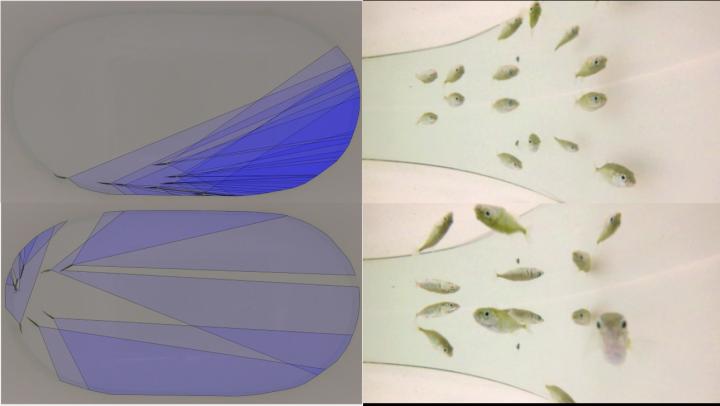
Credit: James Herbert-Read and Hannah MacGregor
The advantages of animals foraging in an orderly group are well-known, but research by the University of Bristol has found an element of unruly adventure can help fish in the quest for food.
The study, published today [1 June] in Nature Communications, sheds new light on why fish shoals frequently switch between behaving in states of extreme order and disorder. It found certain individuals perform better when the group is disordered because they are more observant and faster to find sources of food, while others excel by following the orderly crowd and exploiting their more proactive peers.
Lead author Dr Hannah MacGregor, Research Associate in the School of Biological Sciences, said: “We know how animals behave in collective formations, but the benefits of this are less well understood. The findings of our study are intriguing because they reveal why swarm-like fish shoals are in a constant state of flux, as each fish vies for order or disorder to hold sway depending on the state in which they individually perform best.
“It was surprising that the unruly, more disruptive fish can have a competitive edge when it comes to foraging, since they are more alert and able to seek out new food sources which might escape the attention of others.”
The study monitored 12 groups of three-spined sticklebacks over a month. It measured how quickly individual fish in shoals located a food source that appeared unpredictably in their environment. By repeatedly testing the responses of the same groups, it was possible to measure whether individual fish performed better or worse depending on how organised the group was when the food appeared.
“The disorderly ‘first responders’ to the food were quickest and in the minority. It was fascinating to see not only how individual styles varied, but also that the fish generally swam in their shoals in the way that was most advantageous for themselves,” Dr MacGregor said.
“Those that thrived in disorder tended to swim less aligned to their neighbours, suggesting they may try to disrupt the shoal in case more food appears.”
A recognised benefit of foraging in an orderly group is the sharing of information about the location of food. Individuals that rely more on this social information benefit from a highly organised formation that allows the information to be transmitted more effectively.
However, the study showed how some individuals are particularly good at detecting the food independently, without the help of their shoal mates. For these individuals, a disorganised group is better because their ability to see the environment is not constrained by needing to face the same direction as the shoal. In addition to this improved line of sight, they also have less competition because others in the group are slower to react.
The findings provide food for evolutionary thought and indicate the need for closer investigation to better understand the complex dynamics within collective animal behaviour and the importance of individual diversity.
Dr MacGregor said: “Highly organised shoals offer better access to social information and protection from predators. But our research indicated that orderly group behaviour may not always be a good thing when foraging if you are a fish that is very good at obtaining your own ‘private’ information about new food resources.
“Conflict between individuals over the preferred organisation of the group could explain why shoals of fish spontaneously transition between orderly and disorderly collective behaviour, as they swim to their different strengths.”
###
Link to video: https:/
Media Contact
Victoria Tagg
[email protected]
Related Journal Article
http://dx.




